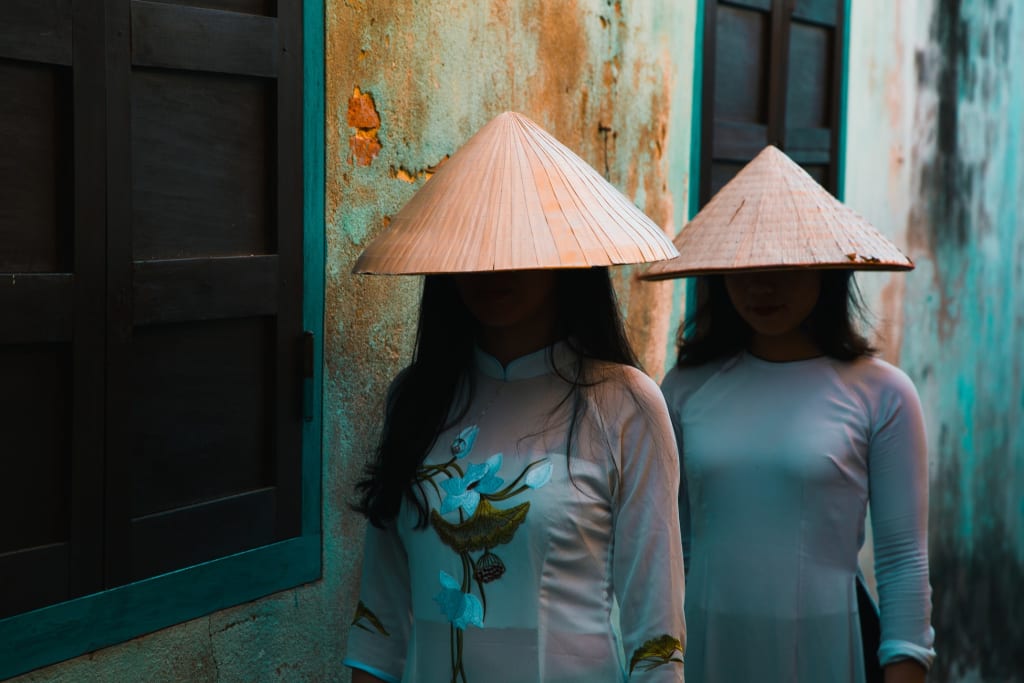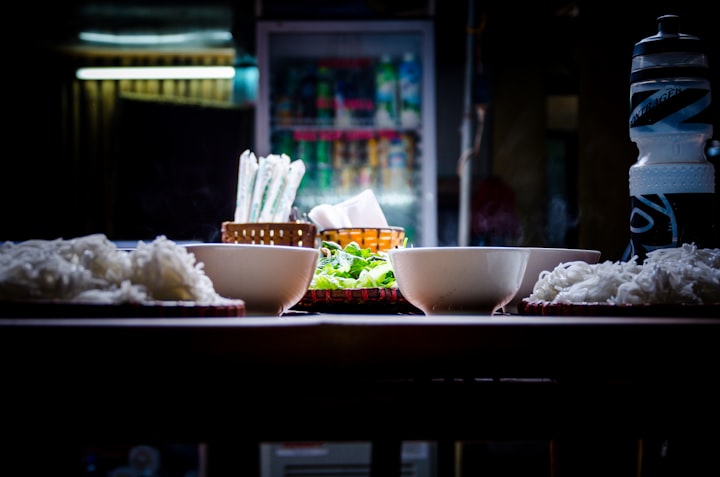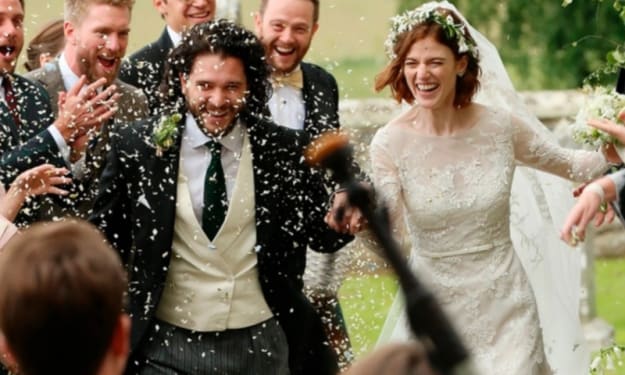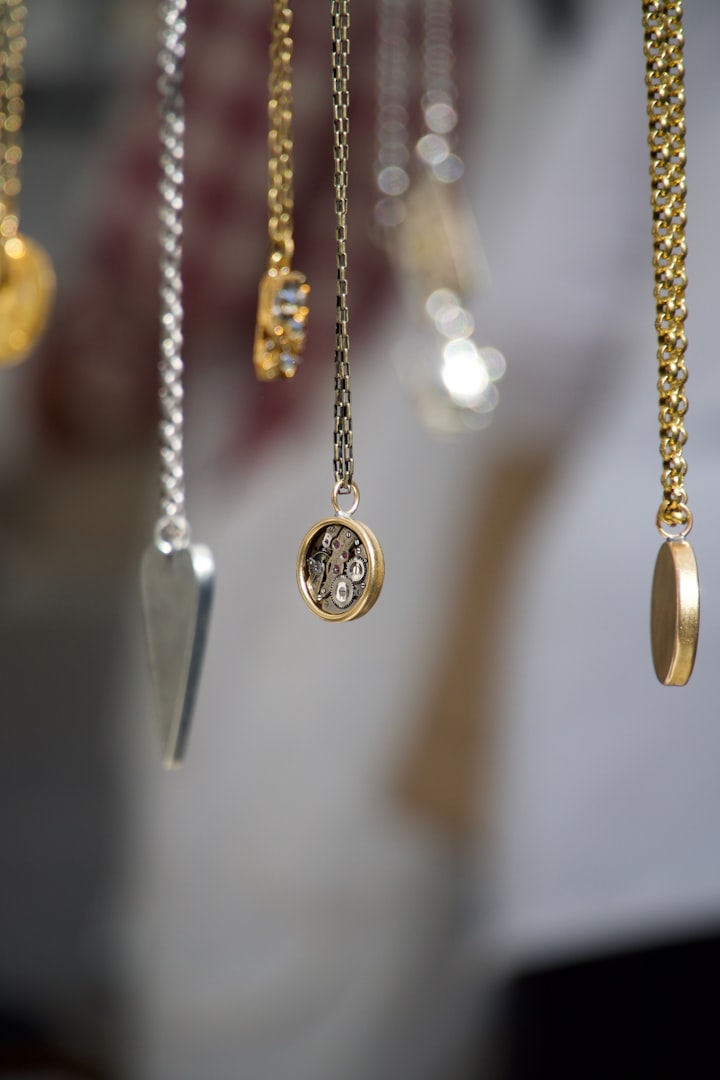The Love Contract
A Guide to a Green Card

“Sit up straight,” my mother said, fixing my collar. “This is important.” Though I’m 23, she had always spoken to me as though I was 12. I went to city college, worked at the bar on the weekends, and at the time, still lived at home with her. When I told her my idea to be a teacher, she scoffed, saying I ought to dream bigger—pharmacist, engineer, computer whatever, like the rest of the Viets who went away for college. She even recommended that I learn how to do nails—it’s good money.
We sat in one of Auntie Linda’s restaurants. In 1992, she had three pho shops in Cuyahoga county. She’s not really my aunt, but like all Viets, I called her the honorary title. We ordered waters. My mother would have never eaten an eight-dollar bowl of pho when she could make a better one at home.
It’s hard being an average Asian; we’re good at so much, so when you don’t stand out, you’re not seen as average, but rather below average. I wasn’t like other Viets. I didn’t test well. Memorization was hard. I wasn’t good with numbers, like my mother, who drove to Canada once a month to gamble. Whenever she played, her unblinking eyes never strayed away from the cards as she calculated the probability of winning.
Auntie Linda was built like a snowman. Her face was powdered white, lips glowing red, and the eyebrows looked to be colored in with a Sharpie marker. Her plump fingers were covered with gold rings. “Get us three bowls of pho,” she called to the waitress.
“No, no, no,” my mother said. “Stupid us. We ate before coming.”
The two women exchange pleasantries about the weather and the health of their families, and I sat quietly like a child between them.
“Let me look at you,” Auntie Linda said, instructing me with her fingers to stand. She twirled her finger and I slowly turned like a rotisserie chicken. I sat down once she was satisfied. The bowl of pho came, but she pushed it to the side and leaned in closer. “I’ll cover the $20,000 upfront. The second $20,000 after the green card. The flight will be covered. I’ll provide employment and residence. You’ll leave in a month. So, will you marry her?”
“Is there a picture of her?”
She slid backward. “I don’t have one. But why does it matter? $20,000? $40,000? Money is money. It doesn’t need to look pretty.”

No one knew about the flight to Vietnam. As far as anyone was concerned, I was in California visiting a cousin. At the time, Nicole and I had been dating for two months. “We’re meeting in California, but my cousin’s bachelor party is in Mexico. So, I’m not going to be able to call you for a while.”
The village was bustling with motorbikes on the day of my engagement party. The women were dressed in vibrant ao dai, while the men wore dress shirts, jeans, and flip flops. The crowd congregated in the large tent erected in the center of the village. There was to be a live band, dancing, a 12-course meal, speeches, and a lot of liquor. I knew no one. I had been in Vietnam for nearly a week and still hadn’t met my future ex-wife.
Upon arrival, a man roughly my age picked me up from the airport and drove us back to the village. My mother gave me a little black book with some important phrases and words to help me navigate the language, but when I tried to make small talk, he didn’t appear interested. So, we sat in silence for three hours. I later learned that his name was Vu. He showed me to a small hut, which was furnished with a little bed. He instructed me to pull the mosquito netting down at night and to make sure there weren’t any gaps for them to crawl inside. Next door was a small shed with several pots filled with rainwater, which he explained was my bathing water.
During the days, I walked about the village and examined the small shops, street vendors, or the families watching me through their screen doors. We were both curiosities to one another. Vu would leave me meals in the hut—pho, bun, broken rice—but outside of that, he was rarely present.
But, on the day of my engagement, I was glad to see his familiar face. I called out to him, but like all those other moments, he didn’t respond. I couldn’t tell if he was upset, didn’t hear me, or just didn’t care. I let the feeling go and went inside, pushing through the crowd. In the middle was a petite young woman dressed in a red ao dai and yellow hat, which reminded me of a crown. Upon seeing me, the elder family members escorted me to her side. Her face was a porcelain white; her hair black; and her eyes, looked at the ground. The villagers flanked us, pushing us together. The photographer counted to three and the light flashed. “Hold her hand.” I reached down for it but felt only empty fabric. Her sleeves were too long, I thought. When I reached higher and higher, still there was nothing to hold on to. “Change sides,” the photograph instructed. “He needs to be pictured holding a hand.”

Her name was Thao, and we lived together in an apartment outside of the Cleveland city limits—one of Auntie Linda’s buildings—a studio next to a bar. She didn’t charge us rent, but we paid for electricity and water. A month after Thao landed, we threw a party and took photographs, which we’d show the immigration officer as proof of our love, but our real wedding was a quickie JOP wedding. The judge presiding over us wore a grey sweatshirt and jeans underneath his robe. His wife acted as our witness.
I placed the ring on the right hand rather than the left, which reached just beyond her elbow. The judge asked us if wanted to say something, I told her that I promised to protect her, provide for her, and always love her for the rest of my life.
She spoke in Vietnamese.
“What did she say?” the judge asked.
She had asked how much longer because she was jetlagged and hungry. “She said she appreciated my sentiment and felt the same way.”
It was a one-bedroom apartment, but she slept on the couch while I took the bed. She insisted. Thao didn’t speak English and my Vietnamese was crap. It wasn’t something I had ever relied on, so again, I took out the little black book and tried to communicate with her, but like Vu, she ignored me. So, I went to work and came home, like I imagined all husbands did, and Thao would clean the house, do one-arm chin-ups and push-ups, go the Auntie Linda’s restaurant to work, and then bring home dinner. We’d work and come home, never saying anything to the other, and that was what worried me. How would we pass the interview to get the other $20,000?
She and I lived like this for almost three weeks, and then it just so happened that on this day, we both had the day off. She was sitting at the kitchen table writing in what looked to be a journal. When she caught me watching, she quickly closed it.
“Don’t spy on me,” she said in Vietnamese.
“Don’t worry,” I said in English. “I can’t read it.”
“What?”
I did my best to translate.
“You sound stupid when you talk.”
“You look stupid when you clap.”
And that was the first time we had ever laughed.
I didn’t know if I had to love her, but if we were going to appear as a married couple, it was important that we at least looked like we liked each other. I posted the names of objects all over the apartment and got her an ESL textbook, but those items found their way into the trash. I was a horrible teacher. When I went to my black notebook, I found that she had written inside—I don’t need your help. I tried to get my mother involved, but to no avail, as they just ended up arguing. Though we weren’t a real family, it felt like we fought like one, which to a certain extent was progress.
Thao was cutting a chicken on a cutting board on the ground. She used her left foot to guide the blade. “Stop staring at me,” she said.
“I’m sorry.”
“You are always sorry,” she said. “Like a child, can’t do anything for yourself. You must get your mother to do things for you. You can’t talk to me like a man.”
“It’s because I can’t talk to you.”
“You are right now.”
“But it’s so hard.”
She stopped cutting. With the flat of the blade, she tapped where her arm ended. “This is hard. Living in a place where you know no one is hard. Not be able to talk to anyone is hard. Being alone is hard. Not having two hands is hard. Being away from my son is hard. You? Nothing is hard. Everything about you is soft.”
“You have a son?”
I wanted to hold her, but I was afraid—she was still holding the knife. But she didn’t need that. “We have time together,” I said. “We don’t have to live like strangers. Can we be friends?”
“Just friends?”
“Just friends.”
Though she didn’t need to work, she still insisted on going to Auntie Linda’s restaurant every day, but when her shift ended, I took her out to see the city. We had sushi; went to the movie theater; hiked in the woods; walked along the lakeshore; played miniature golf and drove go-carts. We spoke in English and Vietnamese and in all of the spaces in-between. We memorized one another’s favorite songs, dishes, and colors; listed all the important names in our lives; shared a list of body imperfections—the parts that husbands and wives were privy of. Thao said nothing of her missing arm and instead bragged about what the other one could do—twenty pull-ups and thirty push-ups. With the help of a clothespin, she could play several songs on the guitar. I took Polaroids of us together to build our narrative. And when she wasn’t looking, I took pictures of her cooking, sleeping, and doing her one-arm push-ups. When I constructed our photo album, I caught myself studying her features.

This became our new life. Talk, eat, work, talk, eat, sleep. A month before the interview, she had moved into the bedroom.
“What is it that you write in your journal,” I asked.
She eased out of bed and stretched. Though she was petite, her back was muscular. She sashayed toward the bathroom, and I looked at her limb, which reminded me of a wasp’s stinger.
“Do you write about your son?”
Even though I had memorized so much of her life, there was still a world that she kept from me. I wanted to know the story of her arm; what her son’s name; if she was going to stay with me; if she imagined me as a father; or simply, if she loved me back?
The toilet flushed.
“What do you want to do?”
She turned off the lights and crawled back into bed. The neon lights from the bar sign covered our bodies in a soft green glow. I felt light kisses fluttering down my neck. Our green bodies were twisted, and under the light, it was impossible to tell where I began and where she ended as though we were one and the same.







Comments
There are no comments for this story
Be the first to respond and start the conversation.